Question And Answer
Publications
Articles, publications, books, tools and multimedia features from the U.S. Institute of Peace provide the latest news, analysis, research findings, practitioner guides and reports, all related to the conflict zones and issues that are at the center of the Institute’s work to prevent and reduce violent conflict.
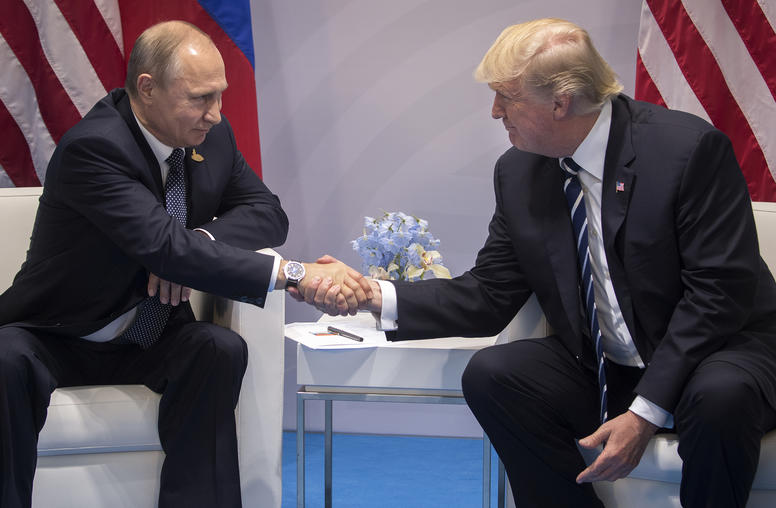
Can the Trump-Putin Summit Improve U.S.-Russian Relations?
Following a meeting between U.S. National Security Advisor John Bolton and President Vladimir Putin this week, the White House announced that President Trump will sit down with his Russian counterpart for their first formal summit on July 16 in Helsinki, Finland. While both presidents Trump and Putin have repeatedly emphasized the need for improved ties, there are a host of contentious issues—such as the invasion of Ukraine and subsequent U.S. sanctions, Russia’s interference in U.S. and European elections, and the Syrian civil war—that could derail the effort to improve the bilateral relationship.
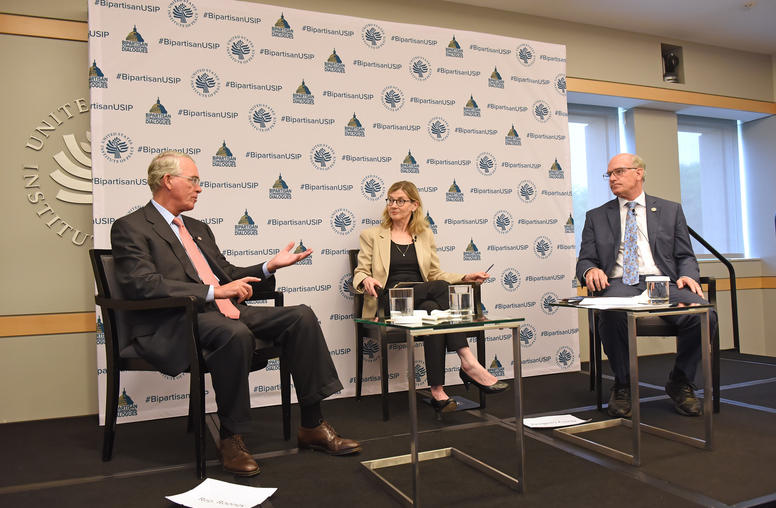
Russia’s Disruptive Ambitions Require a Bipartisan Response
For over a decade, Russia’s Vladimir Putin has campaigned to subvert the liberal world order and undermine global norms by invading neighbors and interfering in democratic processes at home and abroad. To explain how Congress can counter Russian aggression, members of the House Foreign Affairs Subcommittee on Europe, Eurasia and Emerging Threats Rep. Francis Rooney (R-FL) and Rep. Bill Keating (D-MA) came together for a bipartisan dialogue at the U.S. Institute of Peace.

Bill Taylor on Russian Elections and Putin’s Longevity
Earlier this week, Russia’s Vladimir Putin began his fourth term. Ambassador William B. Taylor explains that Putin’s political longevity is a combination of Russia’s desire to feel important in the world again, Putin’s power over the media, and the support of powerful, wealthy friends. Nevertheless, Taylor says harsh U.S. sanctions combined with those from the international community have isolated and punished Russia for Putin’s provocations in Ukraine and elsewhere, meddling in elections, and cyberwarfare.

Ambassador Bill Taylor on the Alleged Russian Use of Chemical Weapons
The alleged Russian use of a chemical weapon against a former Russian spy turned double agent in the United Kingdom led to scores of Russian diplomats being sent packing from the United States and Western Europe. Ambassador Taylor discusses the strong showing of unity among Western nations, and its effect on Russian intelligence gathering efforts and additional U.S. and international economic sanctions.

Mona Yacoubian on the Changing Dynamics in Syria
Mona Yacoubian gives us a glimpse into the changing dynamics in Syria, addressing Assad’s grip on power, Russia’s support, and Iran and Turkey’s roles and interests. Yacoubian also addresses the rising tensions between Turkey and the United States over the Kurds.

Will Russian Peace Efforts Pay Off in Syria?
Russian President Vladimir Putin welcomed Syrian President Bashar al-Assad to Sochi on Tuesday to discuss efforts to end the Syrian civil war. The presidents of Iran and Turkey are scheduled to meet Putin on Wednesday as Russia promises to scale back its military presence in Syria and push for a diplomatic solution.
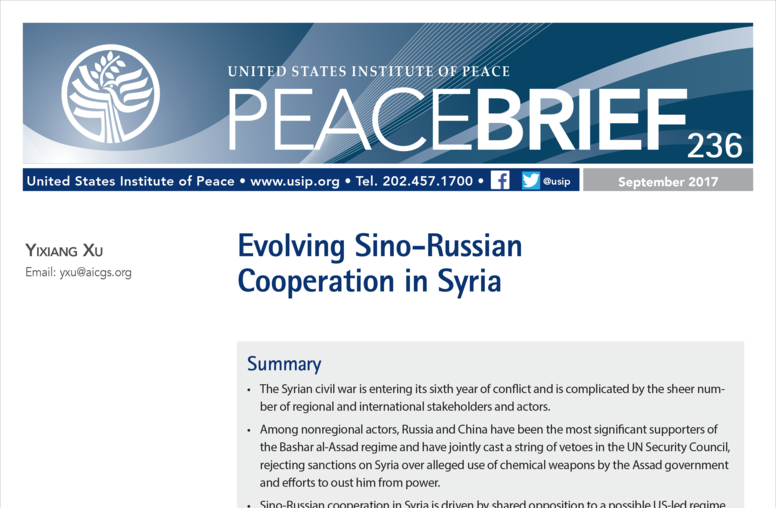
Evolving Sino-Russian Cooperation in Syria
Sino-Russian alignment in support of the Assad government in Syria is driven primarily by the mutual goal of preventing regime change and halting the spread of Islamic extremism. However, because Chinese strategic priorities lie elsewhere and Russia’s tactic of protracting military conflict in Syria contradicts Beijing’s long-term strategic interests, the prospect of future Sino-Russian cooperation in Syria is limited. This Peace Brief examines the forces driving this cooperation as well as its limits.

Action, Not Words, Needed to Improve Ukraine's Investment Climate
Ukraine must not remain a country of great but unrealized potential. The International Monetary Fund package and other foreign assistance are helping stabilize Ukraine’s economy, but only an attractive business climate can result in the level of investment that will truly transform the country for the long term.
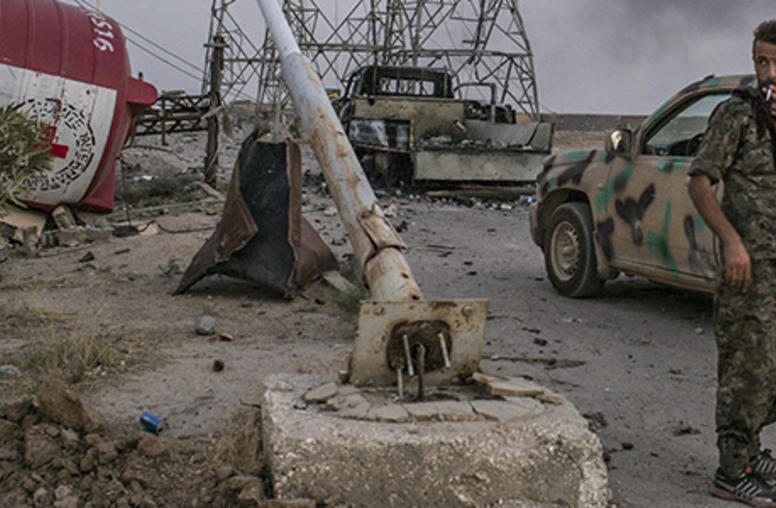
Q&A: Russia’s Intervention in Syria
Russia’s military involvement in Syria has further complicated a four-year-long civil war that the United Nations says has killed more than 250,000 people and driven half the population from their homes. Syrian President Bashar al-Assad just visited Moscow, his first trip outside Syria since the conflict began in 2011 – to meet with Russian President Vladimir Putin. Elie Abouaoun, director of Middle East programs at the U.S. Institute of Peace, considers the ramifications, the prospects for r...
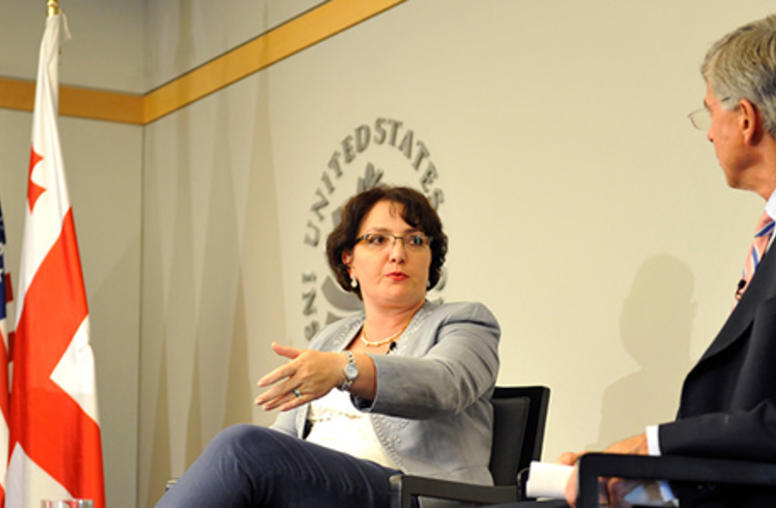
Georgia, Facing Russian Pressure, Needs NATO Path, Defense Chief Says
Even as hostilities continue in Ukraine, Russia is trying to undermine Georgia’s sovereignty with a multi-prong campaign that may not include a direct military confrontation yet poses a significant threat, according to Georgian Defense Minister Tina Khidasheli.